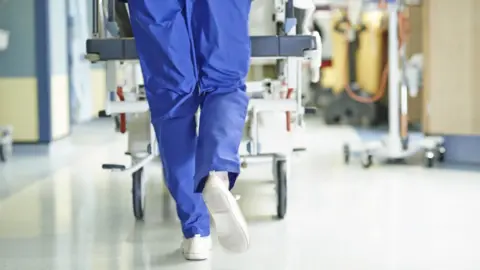Junior doctors vote for strikes in England over NHS pay
 Getty Images
Getty ImagesJunior doctors in England have voted in favour of taking strike action in their fight to get more pay.
Members of the British Medical Association (BMA) are now expected to take part in a 72-hour walkout, possibly as early as mid-March.
The union said junior doctor roles had seen pay cut by 26% since 2008 once inflation was taken into account.
But experts said if a different measure of inflation is used, the fall in pay was lower.
The ballot by the BMA involved nearly 48,000 members working across hospitals and the community - more than two-thirds of the junior doctor workforce.
More than three-quarters of those balloted took part, with 98% voting in favour of action.
'Frustrated, in despair and angry'
BMA junior doctors committee co-chairman Dr Robert Laurenson said the vote showed the strength of feeling about the issue.
"We are frustrated, in despair and angry and we have voted in our thousands to say, 'in the name of our profession, our patients, and our NHS, doctors won't take it any more'.
"The government has only itself to blame, standing by in silent indifference as our members are forced to take this difficult decision."
The results come as nurses and ambulance staff are warning they will escalate their industrial action in their dispute over pay.
Members of the Royal College of Nursing will walk out across half of frontline services in England next week for 48 hours.
Meanwhile, Unison, the biggest union in the ambulance service, is expected to announce more strike dates now that its mandate has increased from five of England's 10 ambulance services to nine.
The term "junior doctors" covers everyone who has just graduated from medical school through to those with many years' experience on the front line. The last time they went on strike was in 2016 over a new contract that had been introduced.
This year, junior doctors' pay increased by 2% as part of a four-year agreement that featured an overall rise of 8.2% between 2019-20 and 2022-23.
Currently, the basic starting salary for a junior doctor is £29,000, but average earnings are higher once extra payments for things like unsociable hours are taken into account.
By the end of their training, which can last 15 years for some, basic pay is more than £53,000.
These are doctors with huge responsibility, leading teams, carrying out surgery and making life-and-death decisions.
Overall they account for more than 40% of the medical workforce.
The Department of Health and Social Care said that, alongside an 8.2% pay rise over four years, the current deal also introduced higher bands of pay for the most experienced staff, and increased rates for night shifts.
Health Secretary Steve Barclay said he had met with the BMA to discuss pay and conditions. The pay award for the 2023-24 financial year is expected to be announced in the coming months.
"We hugely value the work of junior doctors and it is deeply disappointing some union members have voted for strike action," Mr Barclay added.
Sources at the BMA have said the pay demand does not necessarily need to be paid in one go, but until the government agreed to restoring pay, action would continue.
The BMA has yet to decide whether to strike elsewhere in the UK as it awaits more information from ministers about their pay plans in Scotland, Wales and Northern Ireland.
Saffron Cordery, of NHS Providers, which represents health managers, said the prospect of a 72-hour strike was "extremely worrying".
"An urgent resolution is needed if we are to prevent harm to patients."
Junior doctors will walk out of both routine and emergency care - although by law they they can only withdraw from life-and-limb emergency care if the NHS has found other staff to cover for them.
During the 2016 walkout consultants stepped in, but this meant a huge amount of pre-planned treatments such as knee and hip replacements had to be cancelled.
Correction: We amended this piece on the day of publication to reflect the fact the BMA is asking for a pay rise to reverse the cut of 26% since 2008 once inflation is taken into account. We had initially reported it as a demand for a 26% pay rise. The BMA is actually after an increase of 35% to make up for the 26% cut.
